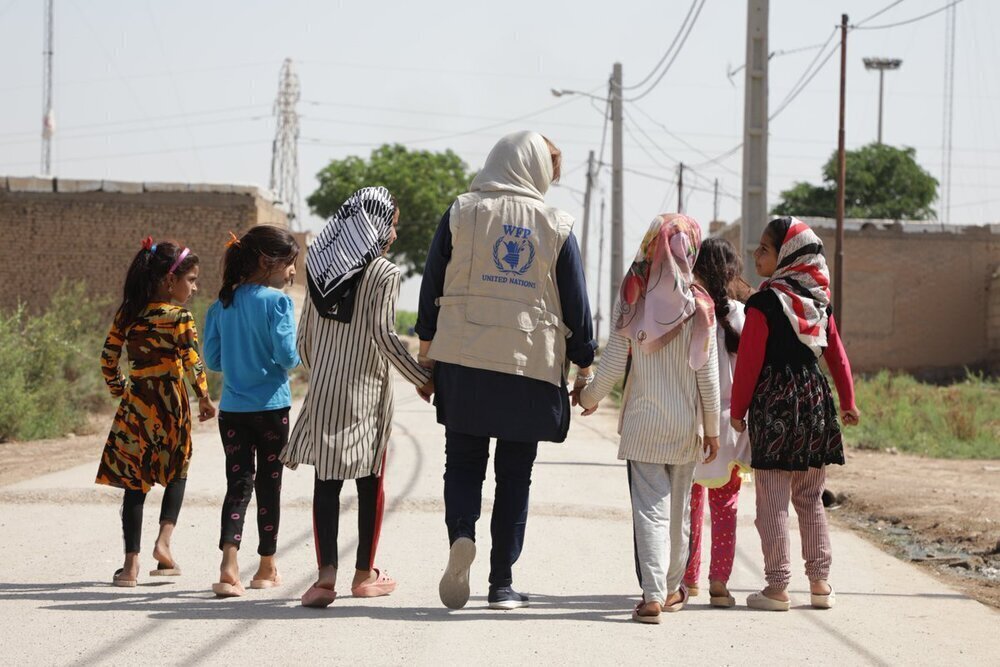WFP releases April-May report on Iran

TEHRAN - The World Food Program (WFP) has released a report, expounding on activities in Iran over the months of April and May.
In April, WFP food assistance reached 33,112 beneficiaries, which includes 32,493 Afghan and Iraqi refugees and 619 Iranian teachers.
Of this 28% were women, 29% were men, 21% were girls, and 22% were boys. Refugees are assisted with a staple food basket which includes fortified wheat flour (9 kg per person per month) and vegetable oil (900 ml per person per month).
In addition to this in-kind food assistance, WFP provides cash assistance to 7,286 Afghan and Iraqi refugee households each month.
In April, households headed by refugee men received Iranian Rials (IRR) 1 million (US$ 2.7, according to the UN Operational Rate) per person.
Households headed by refugee women received a slightly higher monthly cash allocation, amounting to IRR 1.2 million (US$ 3.3) per person due to limited access to working opportunities, leading to higher food insecurity.
Throughout April, WFP distributed school snacks (a combination of milk, biscuits, and date bars) to students and their teachers across all settlements.
The distribution successfully reached 8,101 refugee students and 619 Iranian teachers.
In addition, WFP provided 2,877 refugee girls with a cash incentive of IRR 500,000 (US$ 1.3) transferred to their bank accounts. This is part of WFP Iran’s efforts to promote education for refugee girls by providing them with cash for each month of regular school attendance.
According to recommendations from the February 2022 WFP and UNHCR Joint Assessment Mission, refugees with disabilities were granted by WFP a monthly cash top-up of IRR 1 million (US$ 2.7) in addition to their regular entitlement.
This initiative is currently being piloted in two settlements - Shahid Naseri and Mohajerin. In April, the number of beneficiaries reached 81 out of 100 planned.
In May, WFP’s food assistance reached 33,210 beneficiaries, which includes 32,592 Afghan and Iraqi refugees and 618 Iranian teachers.
Refugees are assisted with a staple food basket which includes fortified wheat flour (9 kg per person per month) and vegetable oil (900 ml per person per month). Of the total assisted, 28 percent were women, 29 percent were men, 21 percent were girls, and 22 percent were boys.
In addition to in-kind food assistance, WFP provides cash assistance to 7,301 Afghan and Iraqi refugee households each month.
In May, households headed by refugee men received Iranian Rials (IRR) 1 million (US$ 2.6, according to the UN Operational Rate) per person. Households headed by refugee women received a slightly higher monthly cash allocation, amounting to IRR 1.2 million (US$ 3.1) per person due to limited access to working opportunities, leading to higher food insecurity.
Throughout May, WFP distributed school snacks (a combination of milk, biscuits, and date bars) to students and their teachers across all settlements. The distribution successfully reached 8,106 refugee students and 618 Iranian teachers.
In addition, WFP provided 2,884 refugee girls with a cash incentive of IRR 500,000 (US$ 1.3) transferred to their bank accounts. This is part of WFP Iran’s efforts to promote education for refugee girls by providing them with cash for each month of regular school attendance.
WFP implemented a pilot initiative in two settlements, Shahid Naseri of Markazi and Mohajerin of Semnan provinces, providing refugees with disabilities a monthly cash top-up of IRR 1 million (US$ 2.6) on top of their regular entitlement. As of May, the program successfully reached 83 beneficiaries out of the planned 100.
Meanwhile, according to WFP’s 2022 report on Iran based on Interim Country Strategic Plan (2018-2023), Iran was one of the most affected countries by the COVID-19 pandemic.
While the pandemic gradually abated and restrictions were lifted by mid-2022, the country continued to struggle with its severe negative socio-economic impacts, the report said.
In mid-2022, the Government decided to cut subsidies from staple food items. As a result, the prices of meat and poultry, dairy products and cooking oil increased fourfold overnight.
Inflation and increased prices of basic food commodities combined with local currency devaluation and reduced job opportunities due to a stagnating economy have significantly reduced purchasing power of vulnerable groups including refugees.
Against this backdrop and despite the tightening of trade restrictions and external barriers, WFP Iran succeeded in meeting its plan of supporting over 32,000 refugees living inside 20 settlements with unconditional food assistance through a combination of locally procured in-kind food and cash-based transfers.
MG
Leave a Comment